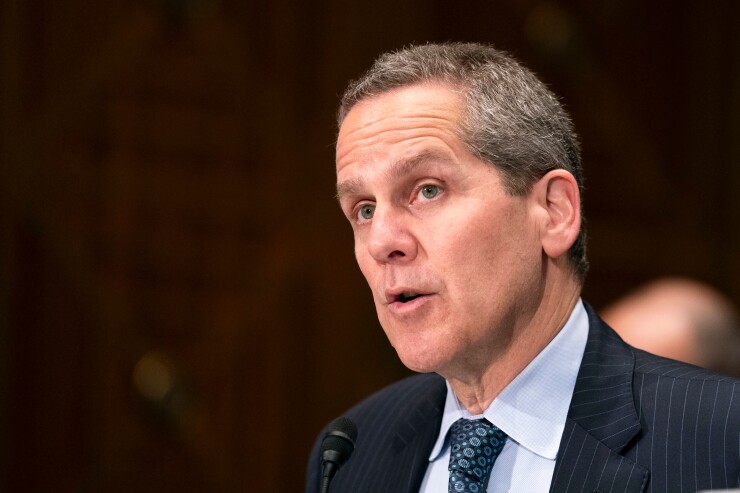
- Key Insight: Fed Gov. Michael Barr thinks that there are better alternatives to making changes to stress testing, such as decoupling the exams from regulatory capital requirements for banks.
- Expert Quote: "I have deep concerns that the set of changes the Board is now considering risks reliance on a stress test that can no longer effectively assess the resilience of the largest banks and lacks credibility, thus putting our financial system and economy at risk," said Fed Gov. Barr.
- What's at stake: Banks have argued that the Fed improperly used its annual stress tests to set capital standards, and have called for more transparency.
Federal Reserve Governor Michael Barr on Thursday pushed back against proposed changes to the central bank's stress testing framework, warning they could give banks too much insight into how the tests are constructed, potentially resulting in "testing [that is] less rigorous and nimble."
During a Thursday afternoon event at the Peterson Institute for International Economics, Barr — a governor on the Federal Reserve Board and the former Fed vice chair for supervision — said he's "worried about the path [the Fed is] on on stress testing" for large banks.
"Proposed changes represent a policy choice to respond to the litigation by enhancing transparency and promoting public participation, and they are not intended to materially affect overall capital requirements," said Barr. "But in my judgment, they are a mistake that will make stress testing less rigorous and nimble."
Barr warned that if stress testing models are subjected to that public comment process, it could cause the tests to "ossify," reducing their effectiveness and adaptability over time. He pointed to previous examples of this kind of ossification, specifically in the supervisory stress testing of Fannie Mae and Freddie Mac, and said those processes "became formulaic and failed to capture escalating risks, with dire consequences."
The Fed official also cautioned that giving banks detailed insight into the stress tests in advance could
Instead of making stress tests a binding part of capital regulation, Barr proposed a different approach: separating the stress tests from regulatory capital requirements entirely.
"This proposed approach of decoupling the stress tests from regulatory capital and increasing regulatory capital to make up the shortfall in the SCB appears to me to be the best way to retain the value of stress testing as a supervisory exercise while maintaining appropriate levels of capital in the system," Barr said.
He continued: "I have deep concerns that the set of changes the Board is now considering risks reliance on a stress test that can no longer effectively assess the resilience of the largest banks and lacks credibility, thus putting our financial system and economy at risk."
Barr also commented on the Fed's future monetary policy, suggesting the central bank will likely move to lower interest rates — though he cautioned that any such action should be taken carefully.
"I do think the most likely base case is that it will be appropriate to reduce rates over time, I just think we need to be cautious about how we do that," Barr said. "I think there's too much focus on what we're going to do between now and December and not enough looking over 2025 and 2026 and thinking what is going to be the sequence and timing of rate cuts over that longer period of time."





